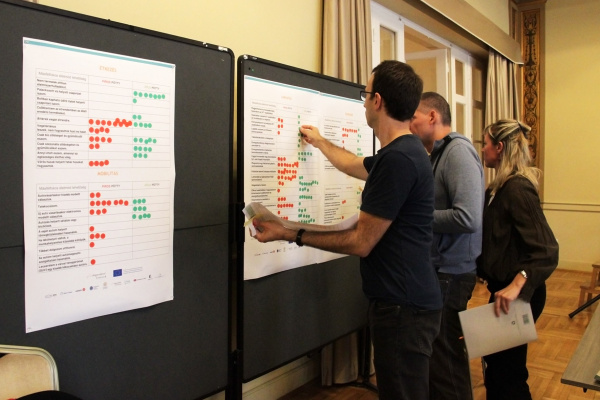
In the lead-up to the Global Climate Strike, European research reveals citizens' views on change needed to achieve 1.5° lifestyles for all.
PRESS RELEASE
3rd March 2023
With one day to go to the next Global Climate Strike, a new European study shows key trends and reasons behind citizens’ acceptance or rejection of sustainable lifestyle change compatible with Paris Agreement goal.
The research found that affordability, infrastructure availability, cultural norms, and lack of knowledge and awareness about 1.5 °C-lifestyle options are significant barriers to citizens adopting low-carbon lifestyle options, providing important insights for policymakers and decision-makers to understand as well as engage with citizens in the pursuit of a sustainable future.
This comes as a result of 5 workshops (Citizen Thinking Labs) in Germany, Hungary, Latvia, Spain and Sweden, where citizens gathered to play a game to transition to 1.5 lifestyles and to have in-depth debates on individual lifestyle options, as a part of the wider European research project EU 1.5° Lifestyles. The aim? Uncover and discuss the motivations and barriers in the 5 countries and have participants express conditions of acceptance to overcome the existing barriers (personal and structural), under country-specific circumstances.
According to Doris Fuchs (Project Coordinator and Professor at WWU Münster), some of the findings confirm existing research and literature on lifestyles and behaviour changes: “For example, replacing one’s car with public transport is very much dependent on the availability of public transport and may decrease people’s feeling of flexibility”, adding as another example that “people feeling very strongly when confronted with changes to their diet towards veganism or vegetarianism, as something extremely personal and emotionally important”. Perhaps surprisingly, the study also shows acceptance to reducing the intake of animal-based products, however, “possibly hinting at the fact that people are willing to change their diet, but not in absolute terms”, says Lena Domröse (Senior Manager at adelphi, and Citizen Thinking Lab’s lead).
Also confirming existing research, the study finds that “energetic refurbishment is often hampered by a lack of financial means” and “lack of information or knowledge about options (such as a switch to an electric vehicle or knowledge about cooking tasty, healthy and nutritious vegetarian meals) was a major barrier for many participants and that more information on certain matters was identified as a major condition of acceptance.” On the positive side, the options to “install solar panels or insulate the home were well received by lab participants”. As one of the participants in the workshop held in Hungary put is: “I think we can do a lot at an individual level for a better future, which we must pass on to others as well.”
The four-year project EU 1.5° Lifestyles started in 2021 and is part of the European Union’s Horizon 2020 research and innovation program. It involves researchers, practitioners as well as advisory board members from Finland, Hungary, Japan, Latvia, the Netherlands, Spain, Sweden, and Germany.
CONTACT
Project Lead:
Prof. Doris Fuchs, Project Coordinator and Professor at WWU: doris.fuchs@uni-muenster.de,
Mobile: +49 176 52231089
Puzzle:
Michael Lettenmeier, Director at D-mat: michael@d-mat.fi,
Mobile: +358 40 54 12 876 and +49 151 50 40 26 19
Citizen Labs:
Lena Domröse, Senior Manager at adelphi: domroese@adelphi.de,
Phone: +49 30 89 000 68 - 56 and +49 176 84850691
FURTHER PROJECT INFORMATION
The project’s main aim is to support the mainstreaming of low-carbon lifestyles in line with the aspirational 1.5°C climate target and to facilitate the transformations sought by the Paris Agreement and the EU Green Deal. For this purpose, the project develops guidance for policymakers, intermediary actors and individuals based on scientific evidence on how lifestyle choices affect individual carbon footprints, and how political, economic, and social contexts enable or constrain shifts to sustainable lifestyle options.
The uniqueness of the project approach is that it recognises the important role of politics and policy in facilitating household and lifestyle changes. It demonstrates the potential contributions of individuals and households and clearly articulates where limited agency by households requires structural changes and political and stakeholder intervention. In doing so, the EU 1.5° Lifestyles connects analyses of lifestyle perspectives at the household level in the four realms of nutrition, mobility, housing, and leisure with inquiries into relevant political, technological, economic and social structures at various levels of governance.
To mainstream 1.5 degrees lifestyles, the project develops practical recommendations, which can be integrated into everyday life as well as into EU and national policies. Along the way, the project provides stakeholders at national and EU levels with
- a quantification of climate and health impacts on shifting lifestyles in the EU and within three additional G20 countries (Indonesia, South Africa, Mexico);
- an overview of potentials for and barriers to change at the household level, including options for transitioning to 1.5 degrees lifestyles as well as associated potential risks and opportunities;
- an assessment of structural barriers and enablers for systemic transformations necessary for 1.5 degrees lifestyles;
- assessments of scenarios for economic and welfare systems, and business models compatible with 1.5 degrees lifestyles.
Several stakeholder workshops are held to co-produce outputs and involve target group members, and informational communication materials are disseminated, including concrete guidance for both citizens and decision-makers on transitioning to 1.5 degrees lifestyles.
HIGH-QUALITY IMAGES TO ILLUSTRATE THIS PR CAN BE FOUND HERE.
You can download the pdf of the Press Release here.

